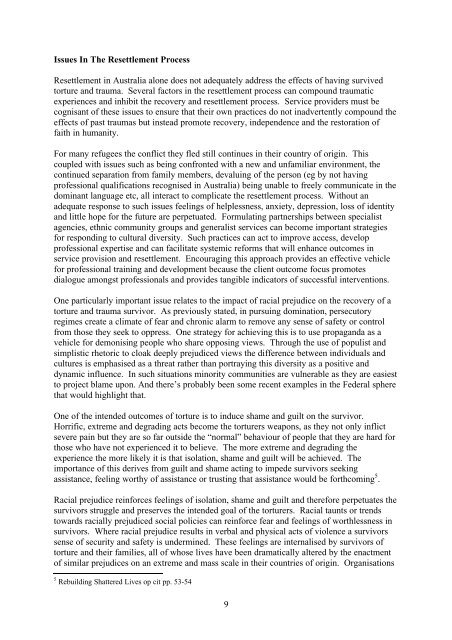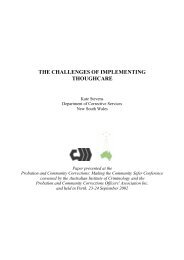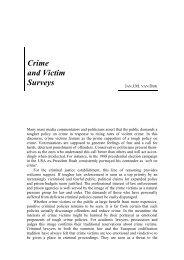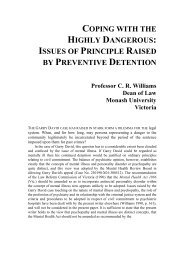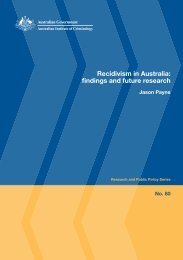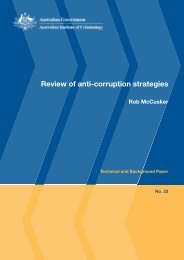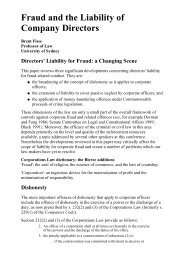Developing cultural responsiveness in the delivery of services to ...
Developing cultural responsiveness in the delivery of services to ...
Developing cultural responsiveness in the delivery of services to ...
Create successful ePaper yourself
Turn your PDF publications into a flip-book with our unique Google optimized e-Paper software.
Issues In The Resettlement Process<br />
Resettlement <strong>in</strong> Australia alone does not adequately address <strong>the</strong> effects <strong>of</strong> hav<strong>in</strong>g survived<br />
<strong>to</strong>rture and trauma. Several fac<strong>to</strong>rs <strong>in</strong> <strong>the</strong> resettlement process can compound traumatic<br />
experiences and <strong>in</strong>hibit <strong>the</strong> recovery and resettlement process. Service providers must be<br />
cognisant <strong>of</strong> <strong>the</strong>se issues <strong>to</strong> ensure that <strong>the</strong>ir own practices do not <strong>in</strong>advertently compound <strong>the</strong><br />
effects <strong>of</strong> past traumas but <strong>in</strong>stead promote recovery, <strong>in</strong>dependence and <strong>the</strong> res<strong>to</strong>ration <strong>of</strong><br />
faith <strong>in</strong> humanity.<br />
For many refugees <strong>the</strong> conflict <strong>the</strong>y fled still cont<strong>in</strong>ues <strong>in</strong> <strong>the</strong>ir country <strong>of</strong> orig<strong>in</strong>. This<br />
coupled with issues such as be<strong>in</strong>g confronted with a new and unfamiliar environment, <strong>the</strong><br />
cont<strong>in</strong>ued separation from family members, devalu<strong>in</strong>g <strong>of</strong> <strong>the</strong> person (eg by not hav<strong>in</strong>g<br />
pr<strong>of</strong>essional qualifications recognised <strong>in</strong> Australia) be<strong>in</strong>g unable <strong>to</strong> freely communicate <strong>in</strong> <strong>the</strong><br />
dom<strong>in</strong>ant language etc, all <strong>in</strong>teract <strong>to</strong> complicate <strong>the</strong> resettlement process. Without an<br />
adequate response <strong>to</strong> such issues feel<strong>in</strong>gs <strong>of</strong> helplessness, anxiety, depression, loss <strong>of</strong> identity<br />
and little hope for <strong>the</strong> future are perpetuated. Formulat<strong>in</strong>g partnerships between specialist<br />
agencies, ethnic community groups and generalist <strong>services</strong> can become important strategies<br />
for respond<strong>in</strong>g <strong>to</strong> <strong>cultural</strong> diversity. Such practices can act <strong>to</strong> improve access, develop<br />
pr<strong>of</strong>essional expertise and can facilitate systemic reforms that will enhance outcomes <strong>in</strong><br />
service provision and resettlement. Encourag<strong>in</strong>g this approach provides an effective vehicle<br />
for pr<strong>of</strong>essional tra<strong>in</strong><strong>in</strong>g and development because <strong>the</strong> client outcome focus promotes<br />
dialogue amongst pr<strong>of</strong>essionals and provides tangible <strong>in</strong>dica<strong>to</strong>rs <strong>of</strong> successful <strong>in</strong>terventions.<br />
One particularly important issue relates <strong>to</strong> <strong>the</strong> impact <strong>of</strong> racial prejudice on <strong>the</strong> recovery <strong>of</strong> a<br />
<strong>to</strong>rture and trauma survivor. As previously stated, <strong>in</strong> pursu<strong>in</strong>g dom<strong>in</strong>ation, persecu<strong>to</strong>ry<br />
regimes create a climate <strong>of</strong> fear and chronic alarm <strong>to</strong> remove any sense <strong>of</strong> safety or control<br />
from those <strong>the</strong>y seek <strong>to</strong> oppress. One strategy for achiev<strong>in</strong>g this is <strong>to</strong> use propaganda as a<br />
vehicle for demonis<strong>in</strong>g people who share oppos<strong>in</strong>g views. Through <strong>the</strong> use <strong>of</strong> populist and<br />
simplistic rhe<strong>to</strong>ric <strong>to</strong> cloak deeply prejudiced views <strong>the</strong> difference between <strong>in</strong>dividuals and<br />
cultures is emphasised as a threat ra<strong>the</strong>r than portray<strong>in</strong>g this diversity as a positive and<br />
dynamic <strong>in</strong>fluence. In such situations m<strong>in</strong>ority communities are vulnerable as <strong>the</strong>y are easiest<br />
<strong>to</strong> project blame upon. And <strong>the</strong>re’s probably been some recent examples <strong>in</strong> <strong>the</strong> Federal sphere<br />
that would highlight that.<br />
One <strong>of</strong> <strong>the</strong> <strong>in</strong>tended outcomes <strong>of</strong> <strong>to</strong>rture is <strong>to</strong> <strong>in</strong>duce shame and guilt on <strong>the</strong> survivor.<br />
Horrific, extreme and degrad<strong>in</strong>g acts become <strong>the</strong> <strong>to</strong>rturers weapons, as <strong>the</strong>y not only <strong>in</strong>flict<br />
severe pa<strong>in</strong> but <strong>the</strong>y are so far outside <strong>the</strong> “normal” behaviour <strong>of</strong> people that <strong>the</strong>y are hard for<br />
those who have not experienced it <strong>to</strong> believe. The more extreme and degrad<strong>in</strong>g <strong>the</strong><br />
experience <strong>the</strong> more likely it is that isolation, shame and guilt will be achieved. The<br />
importance <strong>of</strong> this derives from guilt and shame act<strong>in</strong>g <strong>to</strong> impede survivors seek<strong>in</strong>g<br />
assistance, feel<strong>in</strong>g worthy <strong>of</strong> assistance or trust<strong>in</strong>g that assistance would be forthcom<strong>in</strong>g 5 .<br />
Racial prejudice re<strong>in</strong>forces feel<strong>in</strong>gs <strong>of</strong> isolation, shame and guilt and <strong>the</strong>refore perpetuates <strong>the</strong><br />
survivors struggle and preserves <strong>the</strong> <strong>in</strong>tended goal <strong>of</strong> <strong>the</strong> <strong>to</strong>rturers. Racial taunts or trends<br />
<strong>to</strong>wards racially prejudiced social policies can re<strong>in</strong>force fear and feel<strong>in</strong>gs <strong>of</strong> worthlessness <strong>in</strong><br />
survivors. Where racial prejudice results <strong>in</strong> verbal and physical acts <strong>of</strong> violence a survivors<br />
sense <strong>of</strong> security and safety is underm<strong>in</strong>ed. These feel<strong>in</strong>gs are <strong>in</strong>ternalised by survivors <strong>of</strong><br />
<strong>to</strong>rture and <strong>the</strong>ir families, all <strong>of</strong> whose lives have been dramatically altered by <strong>the</strong> enactment<br />
<strong>of</strong> similar prejudices on an extreme and mass scale <strong>in</strong> <strong>the</strong>ir countries <strong>of</strong> orig<strong>in</strong>. Organisations<br />
5 Rebuild<strong>in</strong>g Shattered Lives op cit pp. 53-54<br />
9


